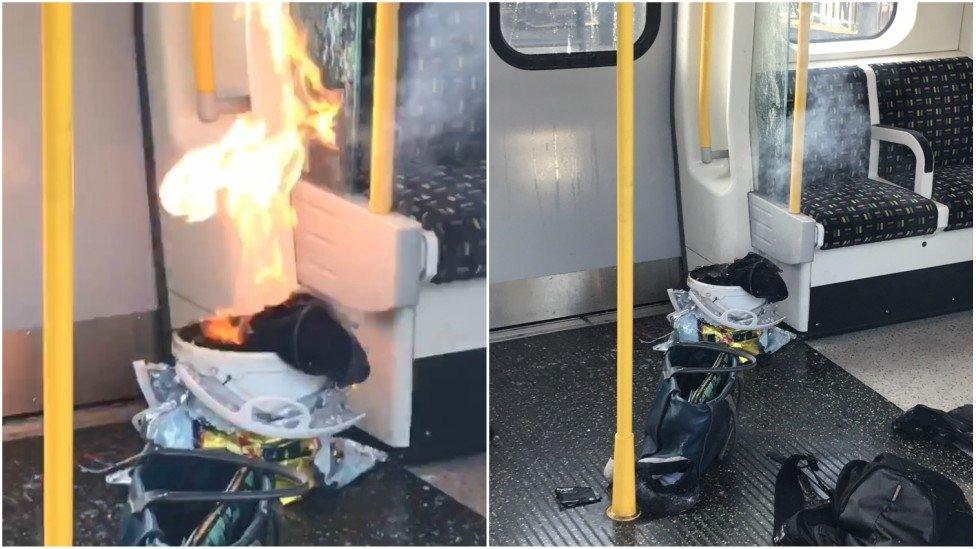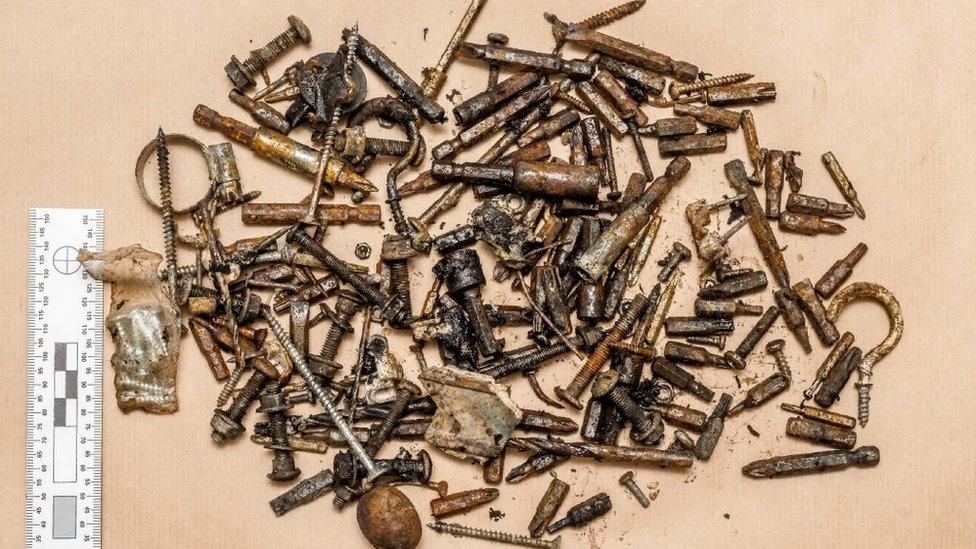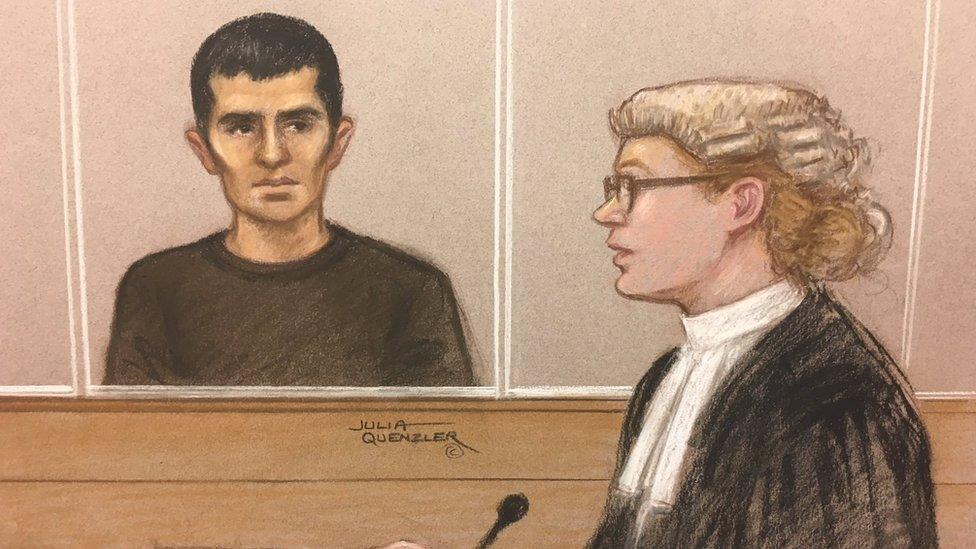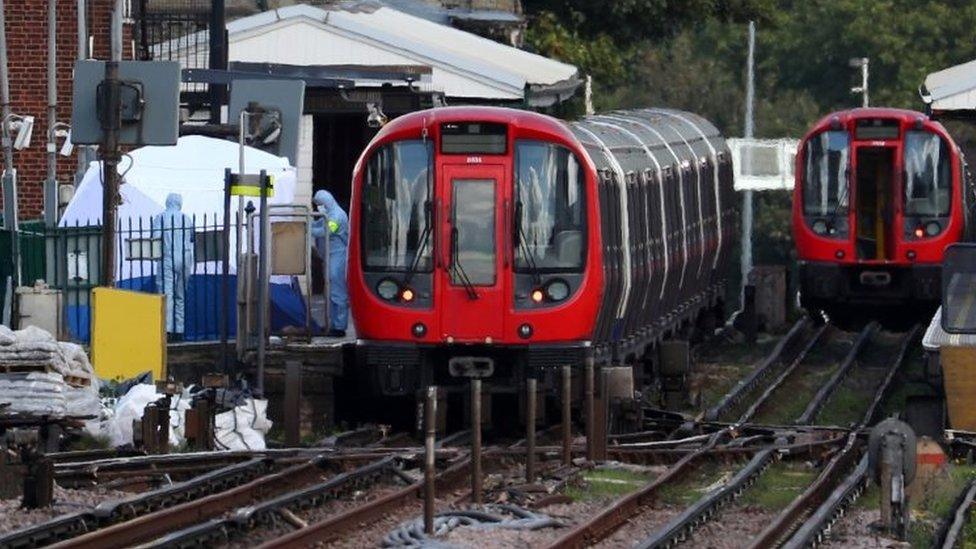Parsons Green: Suspect 'told police' he made Tube bomb
- Published

Ahmed Hassan denies attempted murder and causing an explosion likely to endanger life
The man accused of planting a bomb on a London Tube train admitted to police he made the device, a court has heard.
Ahmed Hassan was arrested the day after the bomb partially detonated on a District Line train at Parsons Green on 15 September 2017, injuring many of the 93 passengers on board.
He denies attempted murder and causing an explosion likely to endanger life.
Det Con James Charalambous said Mr Hassan told him he made the bomb and no-one else was involved.
Prosecutors say Ahmed Hassan built the device and set the timer, before leaving it on the train one stop earlier.
Explosives expert Sarah Wilson said, had the device fully detonated, it had the potential to be "lethal".
She told the court the bomb contained 400g of an explosive that with just one gram could cause "serious injury".

The device partially detonated on the carriage at Parsons Green
Det Con Charalambous told the Old Bailey he interviewed Mr Hassan at the Port of Dover - where he was arrested - at around 10:15 GMT on 16 September.
The Metropolitan Police counter terrorism officer asked the 18-year-old: "Who made the Tube bomb?"
He is said to have replied: "I did."
The officer said that Mr Hassan told police they may also find a small amount of explosives at his home in Sudbury, Surrey.
The court then heard that over the next four days the suspect was interviewed seven more times and answered "no comment".
However, on one occasion he read a prepared statement, which repeated his claim that no-one else was involved in the attack.
'Unstable and unpredictable'
Earlier, Ms Wilson told the court that tests on the remains of the device showed the explosive chemical compound TATP had been used.
The jury heard how just one gram of the chemical compound could cause "serious injury to people or property", but that the device had contained around 400g, along with 2.2kg of shrapnel to cause further damage.
Ms Wilson described TATP as a "sensitive primary high explosive" which is "very unstable and unpredictable" - so is not produced for commercial or military use - and the bomb could be detonated just by being dropped.
It would have taken several hours to create that amount of the substance, she said, along with the small amount that was discovered at Mr Hassan's foster home in Sunbury, Surrey.

The court heard how the device contained 2.2kg of shrapnel
Ms Wilson said all the elements necessary for making the bomb were there, but there could have been "a number of factors" around why it did not work properly, including whether it was made correctly or if it had become wet.
She said: "My conclusion was there had been a partial explosion. Obviously this device had not fully detonated but something quite violent happened.
"It was likely to be a rapid burn rather than a detonation.
"The initiator mechanism, the battery, has functioned but the main charge had failed to function fully."
House search
Another witness, counter terrorism officer Det Con Matt Rogers, told the court his team discovered the word "bored" written repeatedly on the door of Mr Hassan's bedroom when they searched his home on the day after the attack.
Officers found a bottle of hydrogen peroxide on his wardrobe, which prosecutors allege he used to make the bomb, and parts of a soldering kit were found underneath his bed.
They also discovered a ruler and supermarket loyalty card with traces of TATP on it behind a sofa in the house.
'Trained to kill'
On Thursday, the court heard from a number of witnesses to the explosion who described a "rolling fireball" coming towards them.
The jury also heard about injuries to some of the passengers, including hair being set on fire and clothes melting, after the device partially detonated.
CCTV of Parson's Green Tube bomb fireball
On Wednesday, the prosecution also said that Mr Hassan had told Home Office officials, 20 months before the Parsons Green attack, that he had been "trained to kill".
Prosecutor Alison Morgan said he was interviewed in Croydon in January 2016, where he is alleged to have told officials he had been taken by force by the so-called Islamic State group, who had threatened to kill his uncle and brother if he resisted.
The jury has been sent home for the weekend and the trial will continue on Monday.
- Published8 March 2018

- Published7 March 2018
